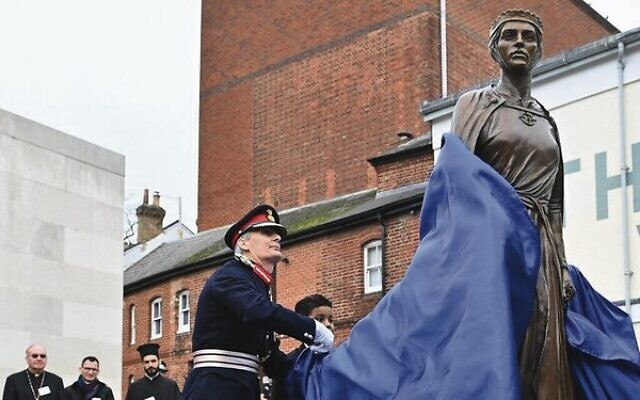Historic honour for trailblazer

A STATUE of prominent English Jewish woman Licoricia of Winchester, who lived during the 13th century, was unveiled in the city this month, attracting a large crowd and drawing the support of local community leaders.
The bronze, life-size statue depicts Licoricia, who ran a successful business and raised four children in Winchester until her murder in 1277. She is depicted with her youngest son, Asser, who is seen holding a dreidel.
Licoricia “has real resonance for today,” according to acclaimed historian and best-selling author Simon Sebag Montefiore.
“She was a woman in a man’s world, an ethnic minority at a time of great racism and prejudice and persecution,” he said.
“Licoricia was a very successful person. She must have been a great character. She was also an outsider in a time ruled by aristocrats and kings, so on so many levels she’s got real resonance especially since there’s a tendency now to deny antisemitism, to deny there was racism against Jewish people and the fact of the matter is she proves that.”
A moneylender, Licoricia had a roster of clients that included King Henry III and Queen Eleanor. Living in times of virulent antisemitism – her death preceded the 1290 total expulsion of Jews from England by only 13 years – she was jailed repeatedly before being murdered in a mysterious attack in Winchester. She was also widowed twice.
Prince Charles was originally slated to officiate in the unveiling, but was forced to cancel his participation in the event after testing positive for COVID.
The prince “is deeply disappointed not to be able to attend today’s events in Winchester and will look to reschedule his visit as soon as possible,” read a statement issued on behalf of the royal family and read aloud during the unveiling ceremony.
The duty of unveiling the statue was passed on to Lord Lieutenant of Hampshire, Nigel Atkinson, local media reported, who did so with the help of local schoolchildren.
The unveiling event continued as planned on what is now known as Jewry Street, where she lived and died, drawing an excited crowd including Christian, Muslim, Sikh and Buddhist community leaders, who came to show their support.
Addressing the audience, Chief Rabbi of the Commonwealth Ephraim Mirvis spoke about the difficult conditions Licoricia must have experienced during her lifetime.
He noted the “sustained horrific persecution of Jews in this country leading ultimately to the expulsion of the Jews from England in 1290”.
And yet, “within those exceptionally trying times there was an extraordinary lady committed to her faith who was determined to raise her family, built a successful enterprise and give a contribution of inestimable value to her country,” he said.
The biblical quote “Love thy neighbour as thyself” from the Book of Leviticus is engraved on one side of the statue, both in Hebrew and English.
The statue was designed by acclaimed British artist Ian Rank-Broadley, known mostly for his royal portraits, many of which have been minted on coins.
No portraits of Licoricia are known to have survived, so Rank-Broadley drew inspiration for her facial features from his own daughter and grandson, who are Jewish.
“The broader message is that we all benefit from letting women take an equal part in our society. It also holds up the fact that as she was Jewish she was persecuted in those times,” Rank-Broadley told The Jewish Chronicle.
TIMES OF ISRAEL/JTA

comments